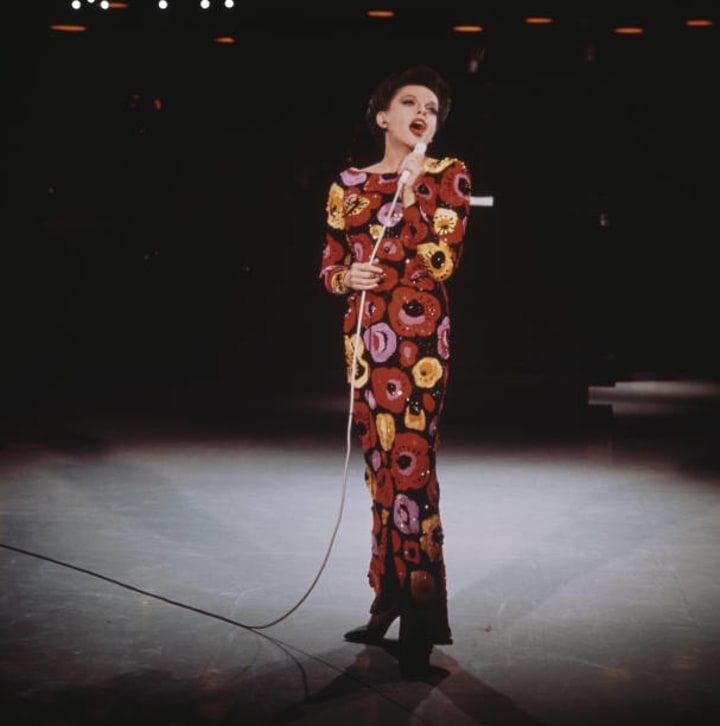Judy Garland's Mother Was The "Real" Wicked Witch
"I never felt wanted unless I was onstage performing"

In almost every photograph and film from her early life, Judy Garland is smiling. From sharing sodas with teenage heartthrob Mickey Rooney to posing for photographs with her elder sisters, young Judy always seemed effervescent and happy.
Garland’s character of Dorothy Gale from The Wizard of Oz, the brown-eyed girl with pigtails and a blue-checkered dress became a fixture in American society at a time when the Great Depression had left businesses reeling.
Judy herself was from a poor family. She wasn’t just an otherworldly, wealthy actress. She was the embodiment of the American dream — a rags to riches story come true.
The cheerful heroine was also the perfect distraction from Adolf Hitler, whose bizarre tirades and emerging fascist regime were sending shock waves across Europe and the rest of the world. Dorothy’s iconic song, Somewhere Over the Rainbow, reflected the lost dreams of a generation.
Beneath the glamour, lights and technicolor of The Wizard of Oz, however, the young actress was suffering immeasurable pain.
The "real" wicked witch of the west

When she learned she was pregnant with her third child, Ethel Milne Gumm considered terminating the pregnancy.
Rumours of Ethel’s husband Frank having affairs with young men and teenage boys must have upset her.
The marriage was so troubled the family would later move to Lancaster, California, to escape rumours about Frank flirting with male ushers at the cinemas he operated.
Against all odds, Frances Ethel Gumm was born on June 10, 1922.
She was the youngest sibling and endearingly referred to as “baby” by her parents and elder sisters, who promptly joined her to become a musical trio.
Ethel took advantage of the move to California by propel her daughters into the spotlight. She played the piano at their performances and spoke fondly of young Frances in interviews, providing the besotted public with feel good stories.
Frances later said she felt forced into performing by her overcritical mother. She was threatened with violent punishments and scoldings if she felt too sick or tired to perform. Ethel always stood in the wings to make sure her daughter didn’t fall out of line. Judy would remember her mother as “the real Wicked Witch of the West.”
“The only time I felt wanted when I was a kid was when I was on stage, performing.” — Judy Garland
Even if her mother pushed her into it, Frances — who became Judy after show business hotshots suggested a stage name —was crazy about performing.
As an outgoing two-year-old, she jumped from her grandmother’s lap and performed a lengthy rendition of Jingle Bells at one of her father’s movie theatres, to the dismay of impatient onlookers who just wanted to watch the latest motion picture.
Little did they know, the charming little girl in front of them would soon be gracing the silver screen herself.
Diets and drugs on the yellow brick road

When she was cast as Dorothy in The Wizard of Oz, the monumental Metro-Goldwyn-Mayer movie set in tornado-stricken Kansas, Judy became an overnight success.
Behind the scenes, Judy was living a nightmare.
After tossing her some sleeping pills, Judy’s mother handed her over to MGM.
Executives immediately criticized the little girl’s weight, petite height, and the natural curvature of her spine. They said she wasn’t pretty enough to be a Hollywood actress, comparing her looks to those of other contemporary female stars.
Louis B. Mayer called the child “my little hunchback.”
The studio heads also assigned a network of people to oversee Judy’s diet, which only consisted of chicken broth and cottage cheese — hardly enough for a young child still growing.
It goes without saying the many photos of Judy and Mickey Rooney sharing sodas and hamburgers were staged. Her employers marketed her as the all-American girl next door, but she wasn’t allowed to enjoy a proper meal.

“From the time I was 13, there was a constant struggle between MGM and me — whether or not to eat, how much to eat, what to eat. I remember this more vividly than anything else about my childhood.” — Judy Garland
Hoping to suppress her “large” appetite, MGM executives prescribed young Judy many different drugs to keep her slim and awake, a common practice at the time.
By the time she was finished filming the most beloved movie of her generation, she was addicted to barbiturates and amphetamines. Judy later claimed other child stars like Mickey Rooney were forced to take similar drugs, but he denied these allegations.
Groped and threatened at sixteen

One of the more hidden parts of Judy’s childhood are her experiences of sexual harassment.
Apart from being coaxed into an eating disorder and drug addiction, Judy was also groped and harassed by her boss, Louis B. Mayer.
Whenever he complimented her singing voice — comprising one of the few times Judy ever received praise during her childhood — Mayer would “place his hand on her left breast to show her just where her heart was.” Mayer repeated this disturbing act many times, until a grown-up Judy finally told him never to do so again.
He, a middle-aged MGM executive who should have known better, reacted by crying.
Mayer wasn’t the only man who harassed Judy during her tumultuous childhood. According to her third husband, Sid Luft, she was also groped by the men who played the munchkins on the set of The Wizard of Oz.
She was also propositioned by another powerful Hollywood executive who she would not name. Her biographer, Gerald Clarke, wrote:
Another executive — Judy did not identify him — summoned her to his office, as he had summoned so many other, more glamorous Metro stars. Eschewing any pretense of small talk, he demanded that she, too, have sex with him. “Yes or no, right now — that was his style,” Judy recalled. When she refused … he began screaming. “Listen you — before you go, I want to tell you something. I’ll ruin you and I can do it. I’ll break you if it’s the last thing I do.”
Even as arguably the most beloved voice of her generation, Judy was not immune from the horrible abuse common throughout much of Hollywood. Her vulnerability as a traumatized, young female actress makes her later life seem sadly predictable.
Somewhere, over the rainbow

Although Judy Garland later had three children — one of them being the well-known actress Liza Minnelli — and continued her music career, she never escaped the traumatic legacy of her childhood.
She was constantly remembered as the woman who had played Dorothy Gale and therefore reminded of the most traumatic period of her life on a daily basis.
The drugs she was given by her mother and employers as a young girl would later result in her untimely death.
Though it is hard to draw a silver lining from the heartbreaking childhood she endured, many people are continually inspired by Judy’s emotional vulnerability on stage.
Her musical performances and interviews alluding to the toxic culture of Hollywood during the 30s, 40s and 50s will probably prevent many other child actors and actresses from the abuse she suffered.
I’ve always taken ‘The Wizard of Oz’ very seriously, you know. I believe in the idea of the rainbow. And I’ve spent my entire life trying to get over it. — Judy Garland
About the Creator
Ilana Quinn
I am a student who loves writing about history, travel, faith and life experiences. Feel free to check out more of my writing at https://linktr.ee/ilanaquinn :)






Comments
There are no comments for this story
Be the first to respond and start the conversation.